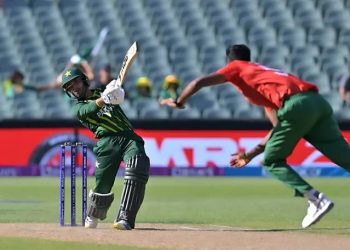The International Cricket Council (ICC) has announced a series of important changes to the playing conditions for men’s international cricket. While several of these updates have already taken effect in the 2025–27 World Test Championship (WTC) cycle, those related to limited-overs formats will become applicable from July 2, 2025.
Stop Clock Introduced in Test Cricket
Following its implementation in white-ball cricket, the stop clock will now be used in Tests to address the persistent issue of slow over rates. Fielding teams must be ready to start a new over within 60 seconds of the previous one ending. Failure to comply will result in two warnings from the umpires, followed by a five-run penalty for each subsequent violation. These warnings reset after every 80 overs. The clock will count upwards from 0 to 60.
Saliva Rule
While the use of saliva on the ball remains prohibited, umpires are no longer required to change the ball immediately if saliva is applied. A replacement will only occur if the ball’s condition is visibly altered. However, five penalty runs will still be awarded to the batting side.
Revised DRS Protocols
The DRS system has been updated to address cases involving multiple potential dismissals. For example, if a batter is given out caught behind but reviews the decision and UltraEdge shows contact with the pad only, the TV umpire can now proceed to check for an lbw dismissal. Previously, the default decision in such scenarios was “not out” if ball-tracking resulted in an “umpire’s call.” Under the new rule, the original decision will be listed as “out,” meaning an “umpire’s call” on the second mode of dismissal will also result in an “out.”
A look at the major changes to the ICC playing conditions across the three men’s formats ▶️ https://t.co/ifxewmO7cf pic.twitter.com/0IQozwP4LL
— ESPNcricinfo (@ESPNcricinfo) June 26, 2025
Chronological Order for Combined Reviews
In reviews involving multiple appeals—such as an lbw followed by a run-out—the sequence of review will now follow the actual order of events. If the batter is found out on the first incident (e.g., lbw), the ball will be declared dead, and the second incident will not be reviewed further.
Catch Review Despite No-Ball
If a potential catch coincides with a no-ball, the TV umpire will still assess whether the catch was clean. If it was a fair catch, the batting team will only receive the no-ball run. If the catch was not clean, the batting team will be awarded the runs completed.
Deliberate Short Runs
In cases of deliberate short running, the five-run penalty remains. However, umpires will now also allow the fielding side to choose which batter will face the next delivery, adding a new tactical element to the penalty.
Full-Time Injury Replacements in Domestic Cricket
The ICC has introduced a trial allowing domestic first-class teams to use full-time substitute players in the event of serious external injuries, similar to concussion substitutes. These replacements must be like-for-like and approved by match officials. The rule does not apply to internal injuries like muscle strains. Adoption is at the discretion of individual cricket boards.




































